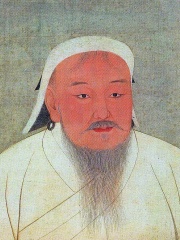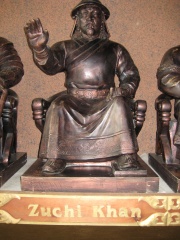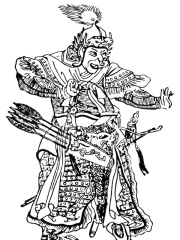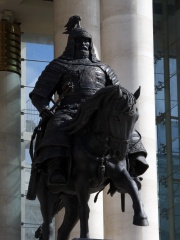



The Most Famous
MILITARY PERSONNELS from Mongolia
This page contains a list of the greatest Mongolian Military Personnels. The pantheon dataset contains 2,058 Military Personnels, 4 of which were born in Mongolia. This makes Mongolia the birth place of the 51st most number of Military Personnels behind Norway, and Bolivia.
Top 4
The following people are considered by Pantheon to be the most legendary Mongolian Military Personnels of all time. This list of famous Mongolian Military Personnels is sorted by HPI (Historical Popularity Index), a metric that aggregates information on a biography's online popularity.

1. Genghis Khan (1162 - 1227)
With an HPI of 98.43, Genghis Khan is the most famous Mongolian Military Personnel. His biography has been translated into 176 different languages on wikipedia.
Genghis Khan (born Temüjin; c. 1162 – August 1227), also known as Chinggis Khan, was the founder and first khan of the Mongol Empire. After spending most of his life uniting the Mongol tribes, he launched a series of military campaigns, conquering large parts of China and Central Asia. Born between 1155 and 1167 and given the name Temüjin, he was the eldest child of Yesugei, a Mongol chieftain of the Borjigin clan, and his wife Hö'elün. When Temüjin was eight, his father died and his family was abandoned by its tribe. Reduced to near-poverty, Temüjin killed his older half-brother to secure his familial position. His charismatic personality helped to attract his first followers and to form alliances with two prominent steppe leaders named Jamukha and Toghrul; they worked together to retrieve Temüjin's newlywed wife Börte, who had been kidnapped by raiders. As his reputation grew, his relationship with Jamukha deteriorated into open warfare. Temüjin was badly defeated in c. 1187, and may have spent the following years as a subject of the Jin dynasty; upon reemerging in 1196, he swiftly began gaining power. Toghrul came to view Temüjin as a threat and launched a surprise attack on him in 1203. Temüjin regrouped and overpowered Toghrul; after defeating the Naiman tribe and executing Jamukha, he was left as the sole ruler on the Mongolian steppe. Temüjin formally adopted the title "Genghis Khan", the meaning of which is uncertain, at an assembly in 1206. Carrying out reforms designed to ensure long-term stability, he transformed the Mongols' tribal structure into an integrated meritocracy dedicated to the service of the ruling family. After thwarting a coup attempt from a powerful shaman, Genghis began to consolidate his power. In 1209, he led a large-scale raid into the neighbouring Western Xia, who agreed to Mongol terms the following year. He then launched a campaign against the Jin dynasty, which lasted for four years and ended in 1215 with the capture of the Jin capital Zhongdu. His general Jebe annexed the Central Asian state of Qara Khitai in 1218. Genghis was provoked to invade the Khwarazmian Empire the following year by the execution of his envoys; the campaign toppled the Khwarazmian state and devastated the regions of Transoxiana and Khorasan, while Jebe and his colleague Subutai led an expedition that reached Georgia and Kievan Rus'. In 1227, Genghis died while subduing the rebellious Western Xia; following a two-year interregnum, his third son and heir Ögedei acceded to the throne in 1229. Genghis Khan remains a controversial figure. He was generous and intensely loyal to his followers, but ruthless towards his enemies. He welcomed advice from diverse sources in his quest for world domination, for which he believed the shamanic supreme deity Tengri had destined him. The Mongol army under Genghis killed millions of people, yet his conquests also facilitated unprecedented commercial and cultural exchange over a vast geographical area. He is remembered as a backwards, savage tyrant in Russia and the Arab world, while recent Western scholarship has begun to reassess its previous view of him as a barbarian warlord. He was posthumously deified in Mongolia; modern Mongolians recognise him as the founding father of their nation.

2. Jochi (1181 - 1227)
With an HPI of 81.23, Jochi is the 2nd most famous Mongolian Military Personnel. His biography has been translated into 60 different languages.
Jochi (Mongolian: ᠵᠦᠴᠢ; c. 1182 – c. 1225), also spelled Jüchi, was a prince of the early Mongol Empire. His life was marked by controversy over the circumstances of his birth and culminated in his estrangement from his family. He was nevertheless a prominent military commander and the progenitor of the family who ruled over the khanate of the Golden Horde. Jochi was the son of Börte, the first wife of the Mongol leader Temüjin, now Genghis Khan. For many months before Jochi's birth, Börte had been a captive of the Merkit tribe, one of whom forcibly married and raped her. Although there was thus considerable doubt over Jochi's parentage, Temüjin considered him his son and treated him accordingly. Many Mongols, most prominently Börte's next son Chagatai, disagreed; these tensions eventually led to both Chagatai and Jochi being excluded from the line of succession to the Mongol throne. After Temüjin founded the Mongol Empire in 1206 and took the name Genghis Khan, he entrusted Jochi with nine thousand warriors and a large territory in the west of the Mongol heartland; Jochi commanded and participated in numerous campaigns to secure and extend Mongol power in the region. He was also a prominent commander during the invasion of the Khwarazmian Empire (1219–1221), during which he subdued cities and tribes to the north. During the 1221 siege of Gurganj, tensions arose between him, his brothers, and Genghis, which never healed. Jochi was still estranged from his family when he died of ill health c. 1225. His son Batu was appointed to rule his territories in his stead.

3. Subutai (1175 - 1248)
With an HPI of 75.70, Subutai is the 3rd most famous Mongolian Military Personnel. His biography has been translated into 47 different languages.
Subutai (c. 1175–1248) was a Mongol general and the primary military strategist of Genghis Khan and Ögedei Khan. He ultimately directed more than 20 campaigns, during which he conquered more territory than any other commander in history as part of the expansion of the Mongol Empire, the largest contiguous empire in human history. He often gained victory by means of sophisticated strategies and routinely coordinated movements of armies that operated hundreds of kilometers apart from each other. Subutai is regarded as one of the greatest military commanders in history, and the single greatest in Mongolian history. He was instrumental in the conquests of Genghis Khan and Ögedei Khan.

4. Muqali (1170 - 1223)
With an HPI of 67.93, Muqali is the 4th most famous Mongolian Military Personnel. His biography has been translated into 20 different languages.
Muqali (Mongolian: Мухулай; 1170–1223), also spelt Mukhali and Mukhulai, was a Mongol general who became a trusted and esteemed commander under Genghis Khan. The son of Gü'ün U'a, a Jalair leader who had sworn fealty to the Mongols, he became known by his epithet "Muqali" ('one who dulls'), earned through his committed and able service to the Great Khan and the Mongol Empire. During the invasion of Jin China, Muqali acted as Genghis Khan's second-in-command, was promoted to Viceroy of China, and was entrusted with a great degree of autonomy once Genghis Khan departed to conquer Central Asia. Unlike many Mongol leaders who were willing to massacre to gain any advantage, Muqali usually attempted to convert foes into friends by more conciliatory means. By the time of Ogedei's reign (1229–1241), he was viewed as the best of the extraordinarily talented pool of Mongol generals. Given his undefeated record despite very limited resources, he might be regarded as the greatest military commander in history. He was "unquestionably one of the leading Mongol personalities and a supreme leader". His wisdom in dealing with local matters has been emphasized.
People
Pantheon has 4 people classified as Mongolian military personnels born between 1162 and 1181. Of these 4, none of them are still alive today. The most famous deceased Mongolian military personnels include Genghis Khan, Jochi, and Subutai.
Deceased Mongolian Military Personnels
Go to all RankingsGenghis Khan
1162 - 1227
HPI: 98.43
Jochi
1181 - 1227
HPI: 81.23
Subutai
1175 - 1248
HPI: 75.70
Muqali
1170 - 1223
HPI: 67.93

